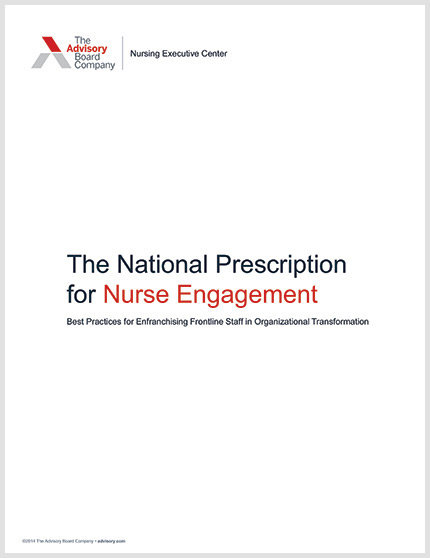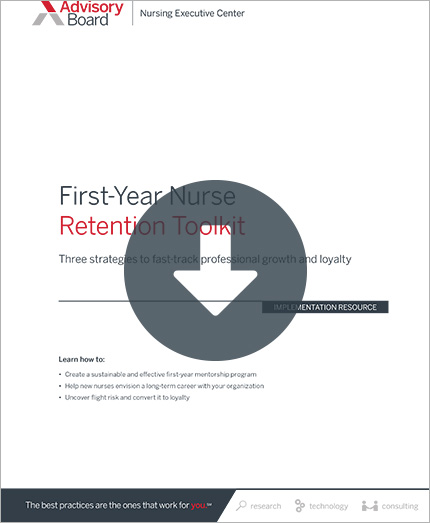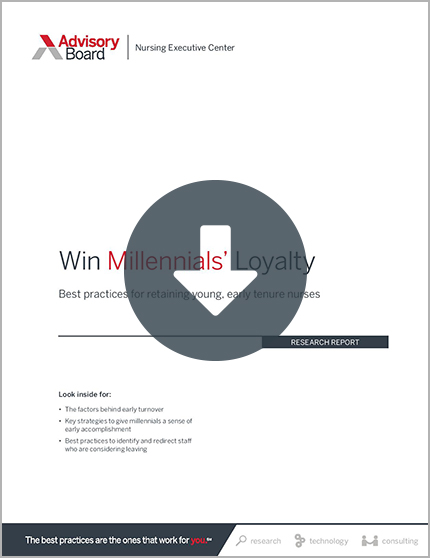Auto logout in seconds.
Continue LogoutEditor's Note: This story was updated on June 11, 2019.
By Joe Infantino, Senior Staff Writer
In today's fast-paced and changing environment, many nurse managers feel overwhelmed by the growing number of responsibilities they must take on, says Advisory Board expert Anne Herleth.
Even some tenured managers struggle to sustain their heavy workloads and are headed for burnout, Herleth says. In fact, 62 percent of nurse managers in a 2014 study said they planned to leave their jobs within the next five years. Worse yet, nurse managers who remain in their role despite feeling overwhelmed can threaten unit performance and critical organizational goals.
"Nurse managers are key to achieving organizational goals," Herleth says. "They're the connection between strategic priorities and front line implementation." That makes ensuring that unit managers have a sustainable workload a top strategic priority in order to avoid burnout and disengagement, Herleth argues.
The main reasons that nurse managers feel overwhelmed can be broken down into two categories, Herleth says.
Specific pinch points preoccupy nurse managers. First, nurse managers' existing scope of responsibilities is being affected by budget constraints and inadequate support systems. As budgets tighten, managers opt to cover bedside vacancies rather than protect support systems for management, Herleth says. Meanwhile, performance scrutiny is higher than ever.
"The number of nursing-sensitive quality indicators continues to rise," Herleth says. "That means managers are on the hook for high performance on an ever-expanding number of metrics, which makes it difficult to maintain focus on all unit outcomes." And when that's the case, nurse managers find themselves spending too much time on "back office" work, which limits the amount of face time they can have with their unit and reduces meaningful rounding time with patients and staff.
More change. Second, the changing health care environment is creating new work for nurse managers. Senior leaders should—and do—focus on training and skill-building to help managers adapt to the fast pace of change and curb initiative fatigue, Herleth says.
"Training and skill development are vital to improving resilience, change management skills, and delegation," Herleth says. "But in addition to these strategies, executives must thoughtfully and proactively redefine the role of the nurse manager."
If leaders don't, they risk "burning out their nurse managers," she adds. "We're reaching a tipping point."
How to reduce nurse manager overload
Herleth suggests two ways to help put an end to nurse manager overload.
1. Limit pinch points to 'unclog the drain.' To alleviate bottlenecks that create a drag on manager productivity, Herleth says some work, such as administrative tasks, should be taken off nurse managers' plates, adding, "Nurse managers should be working to the top of their license."
In order to do that, nursing units need to better leverage in-house support and have nurse managers elevated to a sign-off—rather than in-the-weeds—role for certain tasks.
2. Reduce the flow of new work. Rather than expecting nurse managers to grow into an increasingly unsustainable role, nurse executives must now scope of the role itself by streamlining new strategic initiatives and controlling demands from other departments. In addition, leaders need to buffer against round-the-clock unit-based demands on managers' time.
According to Herleth, many hospitals do not have a communication plan in place for when a nurse manager is off work. That means staff members often contact their nurse manager whenever they have a question, whether to respond to a true emergency or to respond to a simple query that could be answered by another staff member.
At a medical center in Virginia, a nurse manager—needing to truly disconnect from work on her off days—pitched a new communication blueprint. The hospital's policy now utilizes other members in units, including RNs and supervisors, to whom staff can turn when the nurse manager is off-duty and they have a question.
"That kind of strategy empowers staff to handle situations and make decisions," Herleth says.
Millennial nurses are a third of our workforce—here’s how to retain them
In 2016, millennials surpassed Baby Boomers as the largest living generation in the United States. As more millennials have entered the nursing workforce, health care leaders have confronted a growing challenge: young nurses are turning over at higher rates than their older peers, especially early in their careers.
Use the strategies and best practices in this study to build a millennial-specific retention strategy for your organization.
Don't miss out on the latest Advisory Board insights
Create your free account to access 1 resource, including the latest research and webinars.
Want access without creating an account?
You have 1 free members-only resource remaining this month.
1 free members-only resources remaining
1 free members-only resources remaining
You've reached your limit of free insights
Become a member to access all of Advisory Board's resources, events, and experts
Never miss out on the latest innovative health care content tailored to you.
Benefits include:
You've reached your limit of free insights
Become a member to access all of Advisory Board's resources, events, and experts
Never miss out on the latest innovative health care content tailored to you.
Benefits include:
This content is available through your Curated Research partnership with Advisory Board. Click on ‘view this resource’ to read the full piece
Email ask@advisory.com to learn more
Click on ‘Become a Member’ to learn about the benefits of a Full-Access partnership with Advisory Board
Never miss out on the latest innovative health care content tailored to you.
Benefits Include:
This is for members only. Learn more.
Click on ‘Become a Member’ to learn about the benefits of a Full-Access partnership with Advisory Board
Never miss out on the latest innovative health care content tailored to you.



